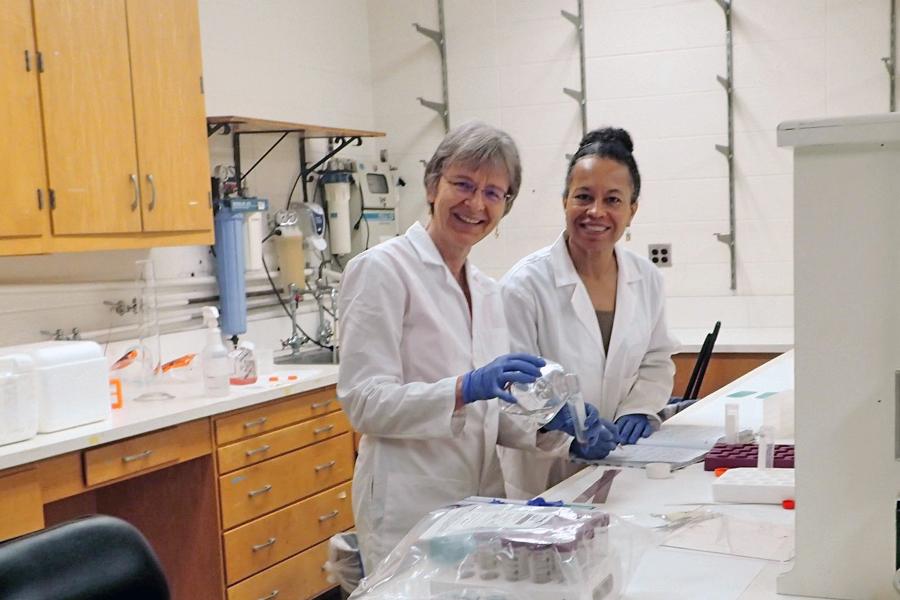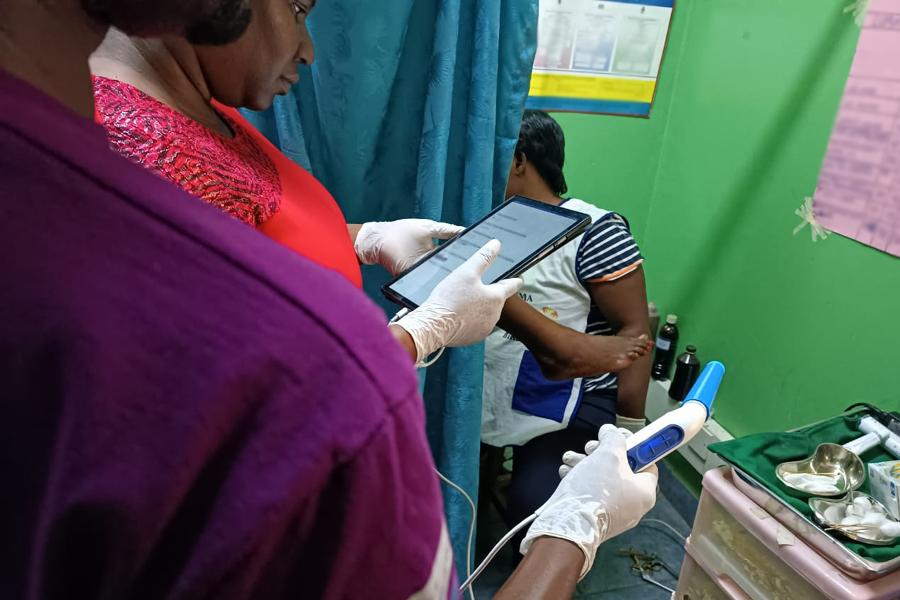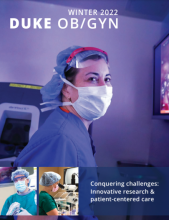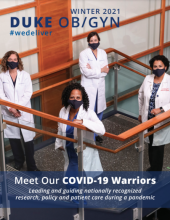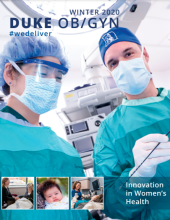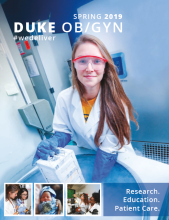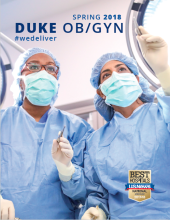Winter 2023 Magazine

Message from Duke Ob/Gyn Chair Matthew D. Barber, MD, MHS
As the chair of Duke Ob/Gyn, I continue to be inspired every day. Our team works together to provide outstanding care to the women in our community, to educate tomorrow’s leaders in women’s health care and to make discoveries that will advance women’s health.
While this past year has brought challenges, including a lingering pandemic, nursing and staff shortages and the Supreme Court’s decision to overturn Roe v. Wade, we continue to strive to achieve our mission: deliver better health and hope to all women and their families through compassionate care, innovation, education and discovery.
As you read this issue of our annual publication, you will note the exceptional work and excellence that has been achieved as we translate research from bench to bedside — and provide hope to our patients and their families.
Study Shows Faster Return to Activity After Prolapse Surgery Is Recommended
Restrictions on activity and lifting after pelvic reconstructive surgery are traditionally recommended for patients. That practice was challenged by investigators at Duke University, led by former Duke urogynecology and reconstructive pelvic surgery fellow Michele O’Shea, MD, MPH, who conducted the Expedited Versus Restrictive: Limitations on Activity Following Surgical Treatment of Prolapse (EVeRLAST) Study.
Top IUD TikTok Videos Often Portray Painful Experiences, Health Care Mistrust
By Alexis Porter, Duke Health News Office
Popular TikTok videos related to intrauterine devices (IUDs) tend to depict negative patient experiences related to pain, while some videos conveyed unreliable information about the contraceptive devices.
Duke Health researchers Jonas Swartz, MD, MPH, medical director of Family Planning and Ryan Program Director, and Jenny Wu, MD, Duke Ob/Gyn resident, led the study published Dec. 6, 2022, in Obstetrics & Gynecology.
Engineering Smart Therapeutics: Innovative Uterine Fibroid Treatment
By Ben Miller, MFA, PMP, Duke Clinical and Translational Science Institute
A collaboration by researchers at Duke and North Carolina Central University (NCCU) aims to offer a more convenient, less invasive treatment for uterine fibroids, one of the most common and under-studied issues in women’s health.
Hormone Therapy Appears To Reduce Risk of Shoulder Pain in Older Women
Preliminary study finds use of hormone replacement therapy might reduce risk of a painful shoulder condition called adhesive capsulitis
By Sarah Avery, Duke Health News Office
Post-menopausal women on hormone replacement therapy had a lower risk of developing a painful shoulder condition known as adhesive capsulitis compared to women who did not receive estrogen, according to a study led by Duke Health researchers.
Helping Patients With Müllerian Anomalies Navigate Care
During pregnancy, Müllerian ducts in a developing fetus undergo changes to become the mature female reproductive tract. When they do not properly develop, conditions known as Müllerian anomalies may be present at a child’s birth, but they are often not discovered until much later in life.
Providers with Duke Ob/Gyn’s Müllerian Anomalies Program help patients to navigate questions around their condition and determine their best options for relieving symptoms and addressing concerns, such as painful intercourse, menstrual leakage and potential pregnancy and delivery issues.
Translating Cervical Cancer Algorithms to Rapid Diagnosis Mechanisms
Megan Huchko, MD, MPH, Hollier Family Associate Professor of Global Health and Ob/Gyn, is co-primary investigator with the Center for Global Women’s Health Technologies Director Nimmi Ramanujam, PhD, on a new $3 million award to explore technologies to improve cervical cancer screening in low-resource settings.
PFAS Contamination and Impact on Maternal Health
An innovative, real-world experiment to evaluate the effects of exposure to per- and polyfluoroalkyl compounds (PFAS) on maternal health and fetal development, and raise awareness at the community level in North Carolina and around the globe, is the focus of the work led by Liping Feng, MD, of Duke Ob/Gyn’s Division of Reproductive Sciences and an affiliate of the Duke Global Health Institute. Her research looks at PFAS mixtures mimicking real-life exposures, not just the effects of single PFAS compounds in isolation.
Fifty Years of Gynecologic Cancer Care and Innovation
The commemoration of the 50th anniversary of Duke Cancer Institute (DCI) and the 50th anniversary of the Division of Gynecologic Oncology is underway. A half century ago, in 1972, William T. Creasman, MD, established the division, becoming its first chief. This coincided with Duke becoming an officially designated Comprehensive Cancer Center by the National Cancer Institute. Learn about Duke Ob/Gyn’s history, milestones and discoveries at Duke in the gynecological cancer field — and where the field is headed.
Navigator Helps Patients Overcome Barriers to Onco-Fertility Treatment
Assisted reproductive technologies designed to counter potential fertility losses among cancer patients offer many new and innovative options, but only a minority of patients who might benefit take advantage of them.
The Duke Fertility Preservation Program is working to increase awareness of these options through greater outreach to both patients and potential referring providers.



